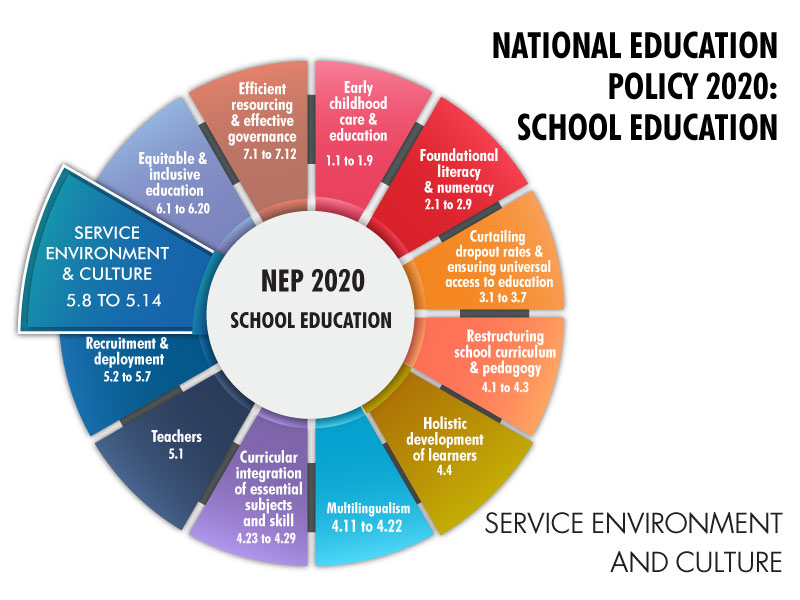The NEP 2020 has reconfigured the curriculum and pedagogy of school education to 5 + 3 + 3 + 4 design with an aim to make them responsive and relevant to the developmental needs and interests of learners at different stages of their development. However, it will not be necessary to make any parallel changes to the physical infrastructure. The policy aims at producing engaged, productive, and contributing citizens for building an equitable, inclusive, and plural society as envisaged by our Constitution.
Service environment and culture
1. A very first requirement in this direction will be to ensure decent and pleasant service conditions at schools. Adequate and safe infrastructure, including working toilets, clean drinking water, clean and attractive spaces conducive to learning, electricity, computing devices, and the internet, library, and sports and recreational resources will be important to provide to all schools in order to ensure that teachers and students including children of all genders and children with disabilities, receive a safe, non-violent, inclusive and effective learning environment and are comfortable and inspired to teach and learn in their schools.
2. The State/UT Government may adopt innovative formats, such as school complexes, rationalization of schools, (without in any way reducing accessibility for children), etc. for effective school governance, resource sharing, and community building. The creation of school complexes, for example, could go a long way towards building vibrant teacher communities. The hiring of teachers to school complexes could automatically create relationships between schools across the school complex; it would also help ensure optimal subject-wise distribution of teachers, creating a more vibrant teacher knowledge base.
3. In collaboration with parents and other key local stakeholders, teachers will also be more involved in the governance of schools/ school complexes, including as members of the School Management Committees/School Complex Management Committees.
4. To prevent the large amounts of time spent currently by teachers on non-teaching activities, teachers will not be engaged any longer in work that is not directly related to teaching, in particular, teachers will not be involved in electioneering, cooking of midday meals, and other strenuous administrative tasks, so that they may fully concentrate on their teaching-learning duties
5. Teachers will be given more autonomy in choosing finer aspects of pedagogy, so that they may teach in the manner that they find most effective for the students in their classrooms and communities. Teachers will be recognized for novel approaches to teaching that improve learning outcomes in their classrooms.
Also read:
NEP 2020: SCHOOL EDUCATION | Holistic development of learners
NEP 2020: SCHOOL EDUCATION | Change in Academic structure
NEP 2020: SCHOOL EDUCATION | Curriculum and Pedagogy
NEP 2020: SCHOOL EDUCATION | Effective resourcing and effective governance
